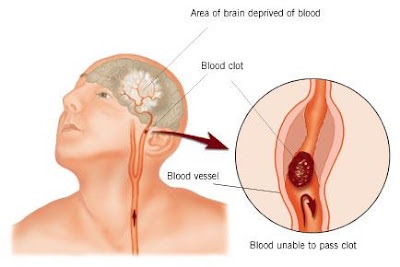
RECOGNIZE DANGER. STROKE symptoms may include SUDDEN:
- Numbness or weakness of the face, arm or leg, especially on one side of the body.
- Confusion, trouble talking or difficulty understanding speech.
- Trouble seeing in one or both eyes.
- Dizziness, difficulty walking, or loss of balance or coordination.
- Severe headache with no known cause
Seek EMERGENCY help @ the first sign of sudden symptoms. Doctors can treat an ISCHEMIC STROKE with tissue PLASMINOGEN activator (TPA), a clot-busting drug that can minimize the risk of lasting disability. But TPA must be given within three hours after STROKE symptoms being, so there is just a SMALL window opportunity. So do NOT wait for possible STROKE symptoms to WORSEN or IMPROVE. Even if symptoms vanish in moments, you still need to get help @ once. Temporary symptoms may be a sign of a transient ISCHEMIC attack (TIA), or MINI-STROKE. A TIA is a warning from your body that a FULL-BLOWN STROKE may happen soon.
DEFEND YOURSELF:
It is better to prevent a STROKE than to treat one. To lower your STROKE risk:
- Know your blood pressure numbers. If your blood pressure is consistently above normal, work with your doctor to lower it.
- Drop the extra pounds. If you are overweight, losing as little as 5 percent to 10 percent of your total weight may help prevent a STROKE.
- Do not light up. Smoking doubles STROKE risk.
- Eat wisely. A healthful diet can help you control three risk factors for STROKE – high blood pressure, high blood cholesterol and excess body weight. Eat plenty of fiber-rich fruits, vegetables and whole grains. Go easy on foods high in saturated fat, Trans fat, cholesterol and salt.
- Move more. Walking briskly every day for as little as 30 minutes may lower risk.
- Control diabetes. Keeping your blood sugar in the normal range helps lower your risk of STROKE.
- Ask about aspirin. If you are older than 50, ask your doctor if taking aspirin will help protect you from STROKE.
- Talk with your doctor if you have ATRIAL FIBRILLATION. A blood thinning medication may lower the increased risk of STROKE caused by this abnormal heart rhythm. Remember, a STROKE can change your life forever. Do everything you can to protect yourself.
Taking FAST action can save your brain. The most important thing to do @ the first sign of a STROKE is to get to a hospital quickly. Rapid medical treatment may limit damage to the brain and improve the chances of recovery. Use this simple FAST test to tell if medical attention is needed:
- Face. Ask the person to smile. Does one side of the face droop?
- Arms. Ask the person toe raise both arms. Does one arm drift downward?
- Speech. Ask the person to repeat a simple phrase. Does the speech sound slurred or strange?
- Time. If you observe any of these signs, call 9-1-1 immediately. An ambulance is the quickest way to get medical care.
NOTE: Another 'sign' of a stroke is this: Ask the person to 'stick' out their tongue. If the tongue is 'crooked', if it goes to one side or the other that is also an indication of a stroke. If he or she has trouble with ANY ONE of these tasks, call 911 immediately!! And describe the symptoms to the dispatcher.


Wow...this is a fantastic article which will wake up many people. Yes, we are all taking for granted our good health. Indeed the overweight is one of the most serious danger for the heart. Let's try to spreed this very important article around all of us. Thanks to have brought this moment of reflexion.We should not be afraid to send it and also to give our thought on this site.S.
ReplyDelete